- Home
- Janice Kay Johnson
Bringing Maddie Home Page 2
Bringing Maddie Home Read online
Page 2
“What’s the story?”
“You know those trees they’ve been taking out in the river park?”
Already feeling apprehension, Colin nodded. The infestation of pine beetles had become obvious when needles turned brown and fell. Some fungus had swept along in the wake of the beetles, taking advantage of the weakened trees. The city parks department had made the decision to cut out the infested ones before they fell in the next windstorm.
“They’re digging out the stumps, where they can get a bulldozer in.”
He knew that, too.
“Pulled one out today and some human bones came with it.”
“Not an Indian burial?”
“No. The foreman’s pretty shaken up. Hasn’t found a skull yet, but there’s a lower jaw. The teeth have fillings in them.” Duane ran a hand through his thinning hair, looking shaken. “Colin, I haven’t been out there yet, but it sounds like this isn’t more than a couple hundred yards from where Maddie was grabbed.”
Maddie Dubeau was Duane’s niece. Frantic at her disappearance twelve years ago, Duane had insisted on taking over the investigation, and nobody had been able to deny him. He’d let Colin, then a young officer who had been first responder, stay involved, going door-to-door with questions and searching the grid. They hadn’t talked about the case in years, but Colin knew that Duane had to be even more haunted by their failure to find her than Colin had been.
His own gaze shifted to a bulletin board where he kept a few photos. Victims whose killers had never been found. A two-year-old beaten to death by her father despite multiple calls to 911 from concerned neighbors, babysitters and medical personnel. Two kids who’d disappeared and never been found. Faces he wouldn’t—couldn’t—forget. Some were personal failures, some were department. He wanted their eyes watching him, even if he didn’t often look back at them.
Madeline Noelle Dubeau’s picture was one of them. It was her last school photo, taken her freshman year of high school. This was more flattering than the one on the learner’s permit he’d found at the scene but had bothered Colin in the same way. In it, she was smiling politely, as though the photographer had insisted, but her wide, cautious eyes weren’t happy. Looking at it, he thought that this was a girl who always stayed a step back, who didn’t expect the best from anyone. Just shy, he’d told himself every time he tried to delve into her secrets, but he couldn’t make himself believe it. He’d never asked Duane, who didn’t like talking about her.
Duane rose and went to the bulletin board, standing with his back to Colin’s desk. His shoulders hunched under his jacket. “I don’t keep a picture of her out. I can’t stand to.”
“Sometimes I’m convinced if I look long enough, I’ll be able to tell what she was thinking.” Impatient with himself, Colin grabbed his weapon from the top drawer and stood, then snagged his suit jacket from the back of the chair. “I’ll drive myself, but I want to see the site.”
“You won’t have any trouble finding us.” After taking one last, long look at the photo of Maddie, Duane flipped a hand and walked out. Colin followed, pausing only to let his assistant know where he was going.
Not until he was behind the wheel of his SUV did he think back to that night. He hadn’t been two months on the job when he’d been sent to the park to investigate an elderly neighbor’s report that she’d heard a woman’s scream.
Teenagers liked the park at night; even in his short time patrolling, Colin had already broken up keggers half a dozen times there. The park, a sizable one, was within city limits, and a stretch along the bank of the Deschutes River was manicured and included a picnic area and playground. Ten or fifteen acres had been left in wilderness, only a couple of dirt paths showing that kids cut from one neighborhood to another through the swath of forest. That night, though, he hadn’t been able to feel the presence of anyone at all. Kids weren’t good at being absolutely quiet. They were prone to giggles or nervous rustling or shushing each other. And he hadn’t known why, but the fine hairs at his nape stirred from the moment he stepped into the darkness, swinging his flashlight beam in an arc to pierce the darker shadows beneath madrona and snowberry.
Sitting here now, in the parking lot outside the police station, he let himself remember how it had been. The moment the yellow beam caught a glint of metal.
He’d been maybe twenty-five yards into the woods when he saw it. A good ten feet off the trail a bike lay on its side. He’d stepped close, squatted on his haunches to look closely and felt a chill. No, the mountain bike wasn’t just lying there, as if temporarily flung aside. One handlebar dug deep in the rusty-red soil and left a track two feet long. Maybe his imagination was excited by the deep night here under the ponderosa and lodgepole pines, by the eerie quiet, by the dispatcher’s description of the shrill scream cut off sharply. But Colin couldn’t help picturing the bike rider hanging on tight, trying to use the bike as an anchor, while someone wrenched him—no, her, if the neighbor had been right—off of it. The front tire rim was bent, the spokes mangled. He thought someone might have stepped right there, the way you might plant a foot on a pet carrier to yank a reluctant animal out.
Rising to his feet, he swept the flashlight beam in a careful pattern. Footprints wouldn’t show up well with the ground so dry, but he could make out scuffed vegetation. Closer to the path, furrows and imprints marked the soil. And a dark patch. He edged nearer, still trying to keep his distance. If this was a crime scene, he didn’t want to taint it and be given hell by the detectives.
Something had been spilled there, and was still wet. Colin had stretched out to his full reach and touched the edge of the spill, then brought his finger to his nose and sniffed. The acrid scent was unmistakable. Blood. A fair pool of it had been lost here. Not enough to suggest someone had bled out, but too much for an innocent accident, even a head wound.
He had just made the decision to go back and call this in when he spotted something else, almost hidden beneath a ceanothus. A wallet...no, a coin purse. Leather, in the shape of a cat’s face, whiskers, nose and eyes burned into the hide and colored. Cute. He tucked the flashlight beneath his arm, put on a pair of latex gloves and picked up the coin purse. Change rattled as he unzipped it and found folded bills in there, too, and a driver’s license. No, he saw, his stomach clenching: a driver’s permit, the kind issued to young teens.
He found himself staring at the photo. A girl’s face, young but somehow not hopeful. She was shy, probably, gazing warily at the camera. A few freckles scattered across a small nose. Instead of being youthfully soft, this face was thin, the wings of cheekbone too prominent, the chin too pointed, the forehead too high. Hair was scraped back into a ponytail. In this light he couldn’t tell what color her eyes were.
Brown, said the description. Hair brown, too. Her name was Madeline Noelle Dubeau. He remembered feeling stunned. He knew that name. Marc Dubeau was a prominent local businessman, a friend of the police chief’s. That last name wouldn’t be common in central Oregon. This almost had to be his daughter.
Madeline, he noted, was fifteen years old, turning sixteen on November 26, when she would be eligible to take the driver’s test for her license.
She was the same age as Colin’s sister, Caitlin.
He turned the flashlight beam again on that dark patch where blood sank into the soil. Anger and a sick feeling squeezed his chest. Would Madeline Dubeau ever have a chance to get that driver’s license?
Colin had tried to convince himself he was letting his imagination run away from him, that she’d had a friend with her who had already helped her make her way home. Or driven her to the emergency room.
But, however green behind the ears he’d been, he knew better. The prickles on the back of his neck said otherwise. Something bad had happened to this girl.
Now in the SUV he grunted, still staring ahead unseeing through the windshield, and remembered the ch
ill when he found out her maternal uncle was a cop, a detective. The department had thrown everything they had at the case, but in twelve years, they had never found a trace of Maddie Dubeau. Unless, today, it was her bones that were wrenched from the earth along with the tree roots.
Shaking his head, he finally backed out and turned onto the street heading north toward the far end of the park.
Traffic, pedestrian and vehicular, was nothing like what it would be in another few weeks once ski season opened. Angel Butte brimmed with tourists during the summer and again when winter arrived. Right now was a lull, when locals took advantage of the chance to dine out or stop by one of the brew pubs without long waits.
Ten minutes later, he left his 4Runner behind a line of other police vehicles on the street and strode along the bulldozed road carved between the stand of woods and the fenced backyards of the nearest homes.
This was early November, with a bite to the air as the thermometer hovered just above freezing. The snow level on the jagged peaks of the Three Sisters and the greater bulk of Mount Bachelor to the north had dropped, a harbinger of the months to come. Colin had substituted a parka he kept in his SUV for his suit jacket. The pungent scent of pine was more powerful than usual, after chain saws and dozers had downed a dozen tall, ancient ponderosas, scarring what had been untouched forest. His every step kicked up the red-dirt legacy of the area’s volcanic past, coating his dress shoes.
He wasn’t thinking about the dust or the smell or the yellow equipment or the voices he heard. He was still caught in his memories of that night, and turned his head to orient himself. Just before he’d parked, Colin had noticed where the trail emerged. He was passing near enough to where he’d found the bike to hit the place with a well-thrown stone.
A chill traveled up his spine. What if Madeline—Maddie to her friends and family—had lain here all these years, waiting? So damn close?
What he couldn’t figure was why he was surprised that they might, at last, be finding her body. He’d expected that someday she’d turn up. After twelve years, dead was a lot likelier than alive.
“Damn,” he said softly, and kept walking. By the time he reached the crowd, he had made sure his face was expressionless.
Heads turned his way, some wearing hard hats. Others he knew: Duane, of course, and two detectives, Jane Vahalik and Ronnie Orr. Vahalik was good. Experienced, despite being only in her early thirties. She’d spent time on the Drug Enforcement Team and been a detective in Criminal Investigations for...he thought three years. Maybe four. Orr had moved over from patrol just a month ago and been assigned to her for training.
He nodded at all of them. Then, hiding his reluctance, he looked toward the vast root ball of the tree and the gaping hole left below it. Not a usual crime scene. The ground had been bulldozed and trampled beyond any hope of combing the top layers of soil for clothing or jewelry or, hell, a cigarette wrapper that might still hold fingerprints. The top feet of soil were heaped where the dozer had pushed them.
Some lucky folks were now going to be assigned the task of sifting through that pile of dirt and needles and branches.
Duane was already standing beside the bones that had been thus far uncovered. Colin joined him and crouched to see better. The pitiful collection was stained red by the soil. Flashes of ivory showed where some had been snapped apart by the violence of their unearthing. Most were unidentifiable to Colin, but he could make out a long bone in multiple pieces, a pelvis, half a dozen shattered ribs and the jaw with a couple of dental fillings.
“Those look too large to be Maddie’s.” He wanted to feel relief, to be sure, but couldn’t.
Beside him, Duane grunted. “I think you’re right. Assuming those pieces are part of a femur.”
Colin was studying the jaw. “Only a couple of small fillings. Molars are all in, but the wisdom teeth aren’t completely.” He glanced up. “Do you know about Maddie’s?”
“No idea. I don’t even know when they’re supposed to come in.”
“I think it varies. Sixteen? Seventeen?”
“A kid, then.” Duane paused. “Maddie was almost sixteen.”
Still feeling apprehension, Colin nodded.
He’d wanted a definitive answer. He had wanted to be told right here, right now, that this wasn’t Maddie Dubeau. Why, he couldn’t have said. Some kid, maybe a young adult, had died and been buried here. It wasn’t as if any good news was in the offing—say that this skeleton would turn out to belong to a scumbag drug dealer who would be unmourned. If—no, when—they figured out whose bones these were, a mother and father, a girlfriend, sisters or brothers, someone was going to be hit with the worst of all possible news. The end of hope. If not the Dubeaus, someone else.
He wondered if Duane held out any real hope Maddie was still alive.
“Okay,” he said with a sigh. “You know what to do. Keep me updated.”
Both men stood.
Colin said slowly, “Wasn’t it just last year that girl’s bones were found out near Prineville?”
Those had been in Crook County’s jurisdiction. “I wonder if they ever identified them?” Duane said thoughtfully. “There was that other girl three, four years ago, too. At the foot of Angel Butte. Wasn’t she yours?”
“Yeah.” Colin had been lead investigator. The small volcanic cinder cone rose right in the middle of Angel Butte and was another city park, where the marble statue of an angel had “miraculously” appeared in the late 19th century to overlook the town.
That girl had been identified. Turned out to be a runaway from Salem, a really sad case. She’d disappeared when she was only fourteen, turned up dead here just before her sixteenth birthday—Maddie’s age. She had been pregnant, they could tell that much, but her body was so decayed no cause of death was ever determined. They hadn’t gotten anywhere near to figuring out how she’d come to be buried beneath a foot of red cinders.
Duane was the one to shake his head. “No reason to look for connections yet. This may turn out to be male. Or older. Hell, he probably got knifed in a drunken fight.”
“Maybe.”
After a momentary silence, Duane said, “You have a hunch.”
Colin moved uncomfortably. “Why don’t I make a few calls? You have enough to do here, and you’re right. Chances are it’s a waste of time.” But he had to satisfy this uneasy feeling, and Duane, like any other cop, would understand.
After a moment, his lieutenant nodded and turned away. “All right,” he called. “Folks, let’s get pictures, and then we’ve got some work to do.”
Colin was reluctant to leave, but he was, essentially, an administrator now. He had to demonstrate trust in not only Duane, but also his detectives. Let them do their job. If he stayed, all he’d do was make them nervous.
He knew from experience, too, that more bones would be uncovered slowly. Officers and evidence techs wouldn’t be digging with shovels; they’d use trowels. From here on out, this would more nearly resemble an archaeological dig than a normal crime scene. It was going to take days, maybe weeks, given the scale of the damage wrought by the bulldozer.
But some answers should be forthcoming soon. With teeth, a femur—assuming that was one—and a pelvis, the medical examiner or a forensic pathologist ought to be able to nail down age and gender. A good guess at how long ago the victim had been buried would provide a starting point, too.
Walking away, he was surprised to feel a clutch of something like grief.
Don’t let it be Maddie.
Damn it, he thought, her parents would probably be relieved if these bones proved to be hers, if they knew at last, once and for all, what had become of their daughter. Who was he to want to prolong the agonizing, fading wisp of hope that she was only gone, not dead?
No one. He had no right to wish that kind of suffering for them. And, Jesus, he didn’t like to
think about what Duane was feeling right now.
But it was his own memory, his own sense of failure, that caught at him now. Instead of going straight back to his SUV, he went to the trail and walked back into the park. Not far—just to the curve where he had found the bike that night. Voices and the sound of distant traffic were muffled here. He stopped, looking at the spot where her blood had soaked into the earth. He remembered the darkness, the thick silence. The crime scene tape that by morning had wrapped from tree to tree, the careful search for evidence never found. And the photos the newspaper had run, not only the one he had kept, but also candid shots of Maddie when she was younger.
Never smiling. Only in the school photo had her lips curved in an obligatory smile. Otherwise, her face was always solemn. Today, he felt the same unease he had then, the same sense that the common description of her as an introverted dreamer wasn’t quite right.
He stood for a moment, as if at a grave site, then finally, shaking his head, turned away. Some old wrongs could be righted. Some couldn’t.
* * *
COLIN SPOKE TO a Sergeant Fletcher in the Crook County sheriff’s department about the bones that had been found by a rock hound out past Prineville the previous year. “Nah, we never identified that kid,” Fletcher said. “Medical examiner’s best guess was that she was maybe fifteen, sixteen years old. She thought female, but you know that was a big maybe.”
Colin made a sound of agreement.
“Thing is, we never found the skull. Probably carried away by an animal. With no teeth to match to dental records, no fingerprints...” Probably he was shrugging. After a moment, he asked, “Have you thought about checking with other jurisdictions? I have this feeling Deschutes County had some bones, too.”
Goddamn. If I were a serial killer, Colin thought, I’d spread the bodies around, too. Good way to avoid anybody getting too interested, in case a few of those bodies were found eventually.

 Home Deadly Home
Home Deadly Home From Father to Son
From Father to Son All the Lost Little Horses (A Desperation Creek Novel Book 2)
All the Lost Little Horses (A Desperation Creek Novel Book 2)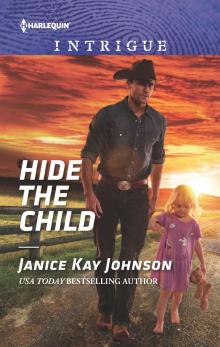 Hide the Child
Hide the Child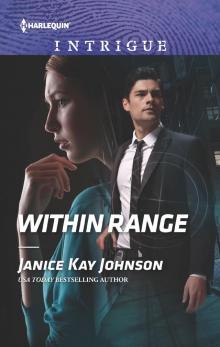 Within Range
Within Range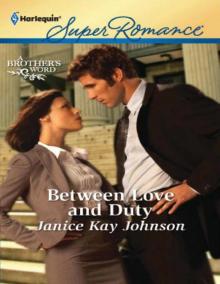 Between Love and Duty
Between Love and Duty First Comes Baby
First Comes Baby Charlotte's Homecoming
Charlotte's Homecoming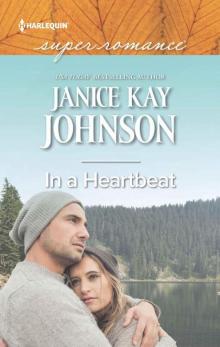 In A Heartbeat (HQR Superromance)
In A Heartbeat (HQR Superromance)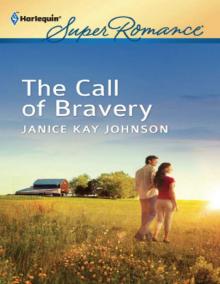 The Call of Bravery
The Call of Bravery In Hope's Shadow
In Hope's Shadow Anything for Her
Anything for Her Harlequin Superromance September 2014 - Bundle 1 of 2: This Good ManPromises Under the Peach TreeHusband by Choice
Harlequin Superromance September 2014 - Bundle 1 of 2: This Good ManPromises Under the Peach TreeHusband by Choice The Baby Agenda
The Baby Agenda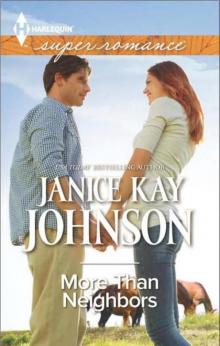 More Than Neighbors
More Than Neighbors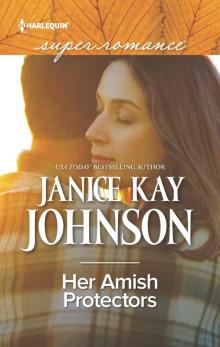 Her Amish Protectors
Her Amish Protectors All That Remains
All That Remains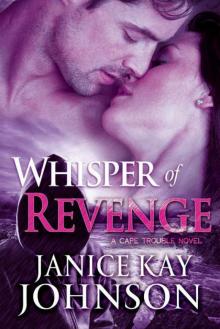 Whisper of Revenge (A Cape Trouble Novel Book 4)
Whisper of Revenge (A Cape Trouble Novel Book 4)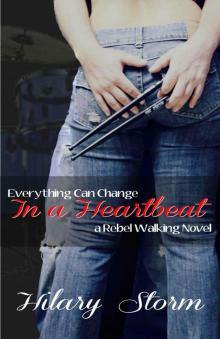 In a Heartbeat
In a Heartbeat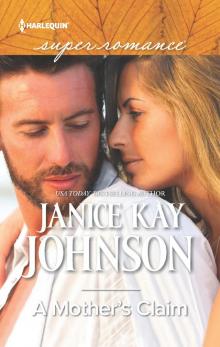 A Mother's Claim
A Mother's Claim Because of a Girl
Because of a Girl Back Against the Wall
Back Against the Wall Dangerous Waters
Dangerous Waters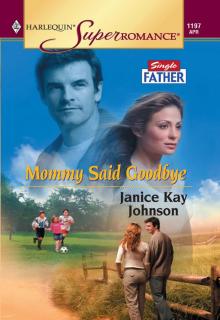 Mommy Said Goodbye
Mommy Said Goodbye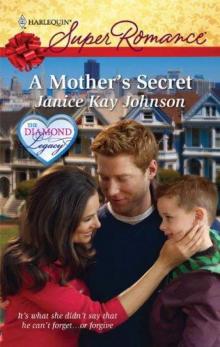 A Mother's Secret
A Mother's Secret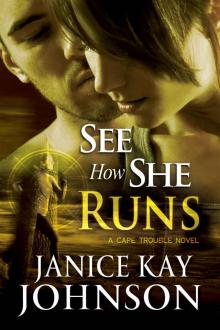 See How She Runs (A Cape Trouble Novel Book 2)
See How She Runs (A Cape Trouble Novel Book 2) Plain Refuge
Plain Refuge Bringing Maddie Home
Bringing Maddie Home For the Girls' Sake
For the Girls' Sake Through the Sheriff's Eyes
Through the Sheriff's Eyes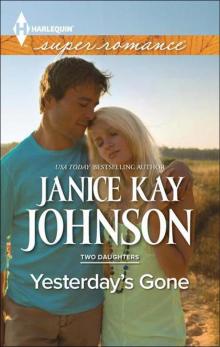 Yesterday's Gone (Two Daughters Book 1)
Yesterday's Gone (Two Daughters Book 1)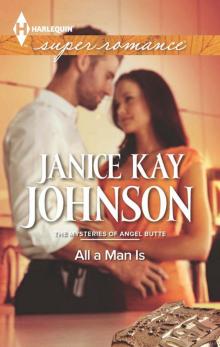 All a Man Is
All a Man Is Harlequin Superromance January 2014 - Bundle 1 of 2: Everywhere She GoesA Promise for the BabyThat Summer at the Shore
Harlequin Superromance January 2014 - Bundle 1 of 2: Everywhere She GoesA Promise for the BabyThat Summer at the Shore No Matter What
No Matter What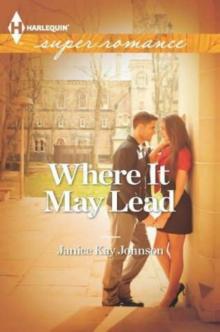 Wakefield College 01 - Where It May Lead
Wakefield College 01 - Where It May Lead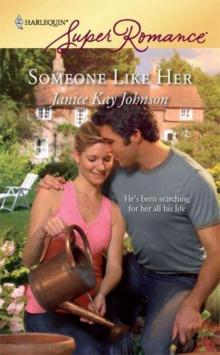 Someone Like Her
Someone Like Her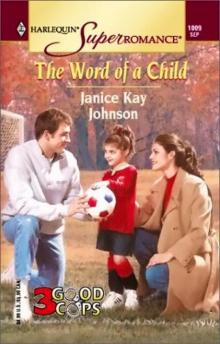 THE WORD OF A CHILD
THE WORD OF A CHILD Harlequin Superromance May 2016 Box Set
Harlequin Superromance May 2016 Box Set Open Secret
Open Secret The New Man
The New Man Finding Her Dad
Finding Her Dad The Perfect Mom
The Perfect Mom All Through The House
All Through The House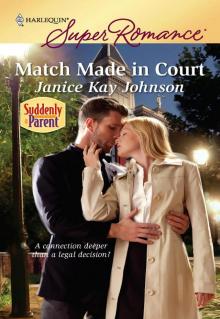 Match Made in Court
Match Made in Court Making Her Way Home
Making Her Way Home From This Day On
From This Day On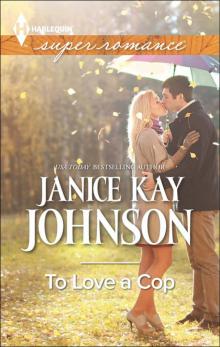 To Love a Cop
To Love a Cop The Hero's Redemption
The Hero's Redemption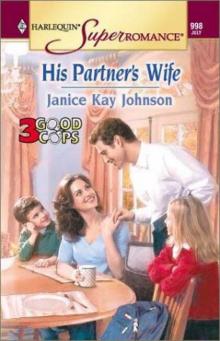 HIS PARTNER'S WIFE
HIS PARTNER'S WIFE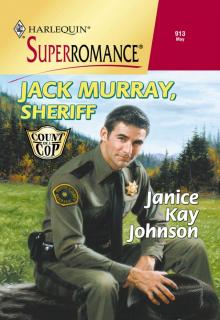 Jack Murray, Sheriff
Jack Murray, Sheriff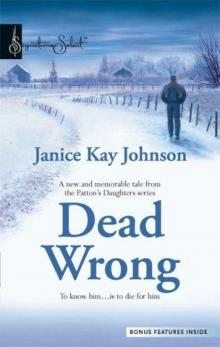 Dead Wrong
Dead Wrong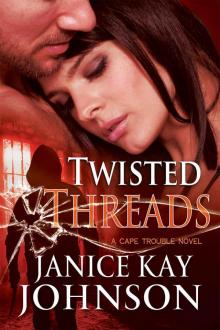 Twisted Threads (A Cape Trouble Novel Book 3)
Twisted Threads (A Cape Trouble Novel Book 3)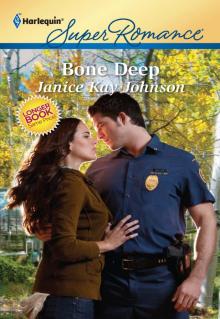 Bone Deep
Bone Deep The Closer He Gets
The Closer He Gets With Child
With Child Whose Baby?
Whose Baby? Kids by Christmas
Kids by Christmas